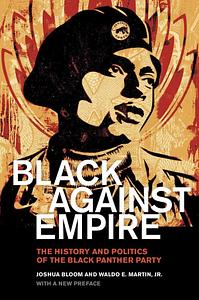Take a photo of a barcode or cover
166 reviews for:
Black against Empire: The History and Politics of the Black Panther Party
Joshua Bloom
166 reviews for:
Black against Empire: The History and Politics of the Black Panther Party
Joshua Bloom
informative
slow-paced
Agonized over this review a bit — on one hand it very much is a one-of-a-kind work that historicizes the incredible legacy of the Black Panthers; on the other it still takes too idealistic a view of certain figures in Panther history (especially Elaine Brown and Richard Aoki) around whom credible allegations of FBI involvement exist.
To be fair, many of these allegations arose after the book was published in 2013, but the issue remains nonetheless that parts of the book now feel historically imprecise. Would be interested to see if the authors release an updated version in the coming years.
To be fair, many of these allegations arose after the book was published in 2013, but the issue remains nonetheless that parts of the book now feel historically imprecise. Would be interested to see if the authors release an updated version in the coming years.
challenging
dark
informative
reflective
slow-paced
At it's peak the Black Panther Party had >$1mil in budget (1970 dollars), an embassy in Algiers, delegations sent to China, Scandinavia, & Vietnam, free schools, breakfast, EMTs, and prison busing, and the nation's college students on strike.
It's inception and it's unraveling took only four years.
This book is incredibly relevant today. It puts the lack of current revolutionary social movements into perspective and outlines what lessons need to be learned and what tasks remain to build another, stronger, movement. It's also an elucidating history of what my high school and college only labeled as 'terrorists'. This book makes today make much more sense.
For something this long, it's engaging all the way through.
It's inception and it's unraveling took only four years.
This book is incredibly relevant today. It puts the lack of current revolutionary social movements into perspective and outlines what lessons need to be learned and what tasks remain to build another, stronger, movement. It's also an elucidating history of what my high school and college only labeled as 'terrorists'. This book makes today make much more sense.
For something this long, it's engaging all the way through.
challenging
informative
medium-paced
challenging
informative
sad
medium-paced
The Black Panthers are a fascinating historical group and this book succeeds in telling their story in an interesting and readable way. However, the book is let down by the bias of the authors. They clearly have deep admiration for the Black Panthers and always present them in the best possible light. While they do mention their flaws, they generally down play them and move on as quick as possible.
I have the feeling the authors exaggerated the level of support for the Panthers, as they give the impression that most black people were sympathetic and their only opponents were racist white police. If any black people ever disagreed with the Panthers, they don't appear in the book. Yet the book never says how many members the group had and is often vague about how many people showed up to their rallies. I read elsewhere that the Panthers had a peak membership of only 5,000 people which is a lot less than this book implies.
There is a complete absence of critical questioning in the book, instead the authors take the Black Panthers statements at face value. There is no examination of the Panthers policies and if they were realistically achievable. The Panthers were excellent at getting publicity but was this style over substance? They claimed they wanted an insurrection against the state yet the book presents them as peaceful, so was this just empty rhetoric? The Panthers traveled abroad to denounce repressive regimes, yet they praised North Korea, a contradiction that receives no comment in the book.
I have the feeling the authors exaggerated the level of support for the Panthers, as they give the impression that most black people were sympathetic and their only opponents were racist white police. If any black people ever disagreed with the Panthers, they don't appear in the book. Yet the book never says how many members the group had and is often vague about how many people showed up to their rallies. I read elsewhere that the Panthers had a peak membership of only 5,000 people which is a lot less than this book implies.
There is a complete absence of critical questioning in the book, instead the authors take the Black Panthers statements at face value. There is no examination of the Panthers policies and if they were realistically achievable. The Panthers were excellent at getting publicity but was this style over substance? They claimed they wanted an insurrection against the state yet the book presents them as peaceful, so was this just empty rhetoric? The Panthers traveled abroad to denounce repressive regimes, yet they praised North Korea, a contradiction that receives no comment in the book.
challenging
informative
reflective
medium-paced
dark
informative
reflective
medium-paced
challenging
informative
sad
medium-paced
This book is very informative and provides a lot of insight into the BPP. In comparison to other history books it was written well enough for it to be digestible for the average reader.


